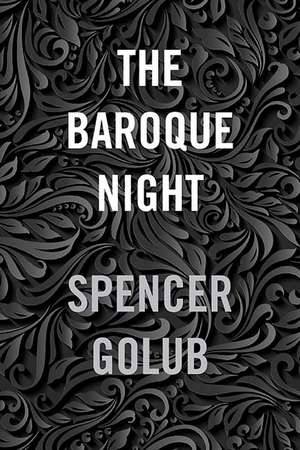The Baroque Night
Autor Spencer Goluben Limba Engleză Hardback – 14 sep 2018
In The Baroque Night, authorial idiosyncrasy hybridizes the concepts of "baroque" and "noir" across the fields of film, theater, literature, and philosophy, arguing for mental function as form, as an impossible object, a container in which the container itself is the thing contained. The book is an experiment in thinking difference and thinking differently, an ethics of otherness and the abstract. Spencer Golub inverts the unreality of the real and the reality of fiction, exposing the tropes of memory, identity, and authenticity as a scenic route through life that ultimately blocks the view.
The Baroque Night draws upon materials that have not previously been included in studies of either the baroque or film noir, while offering new perspectives on other, more familiar sources. Leibniz's concepts of the monad and compossibility provide organizing thought models, and death, fear, and mental illness cast their anamorphic images across surfaces that are deeper and closer than they at first appear. Key characters and situations in the book derive from the works of Alfred Hitchcock, Henri-Georges Clozot, Jean-Pierre Melville, Oscar Wilde, Georges Perec, Patricia Highsmith, William Shakespeare, Jean Racine, Pierre Corneille, and Arthur Conan Doyle, among many others.
This is virtuality and reality for the phobic, making it a fascinating and viable document of and episteme for the anxious age in which we (always) find ourselves living, though not yet fully alive. This performance of suspect evidence speaks to and in the ways we are organically inauthentic, the cause of our own causality and our own worst eyewitnesses to all that appears and disappears in space and time.
The Baroque Night draws upon materials that have not previously been included in studies of either the baroque or film noir, while offering new perspectives on other, more familiar sources. Leibniz's concepts of the monad and compossibility provide organizing thought models, and death, fear, and mental illness cast their anamorphic images across surfaces that are deeper and closer than they at first appear. Key characters and situations in the book derive from the works of Alfred Hitchcock, Henri-Georges Clozot, Jean-Pierre Melville, Oscar Wilde, Georges Perec, Patricia Highsmith, William Shakespeare, Jean Racine, Pierre Corneille, and Arthur Conan Doyle, among many others.
This is virtuality and reality for the phobic, making it a fascinating and viable document of and episteme for the anxious age in which we (always) find ourselves living, though not yet fully alive. This performance of suspect evidence speaks to and in the ways we are organically inauthentic, the cause of our own causality and our own worst eyewitnesses to all that appears and disappears in space and time.
Preț: 835.57 lei
Preț vechi: 1018.98 lei
-18% Nou
Puncte Express: 1253
Preț estimativ în valută:
159.91€ • 166.51$ • 135.14£
159.91€ • 166.51$ • 135.14£
Carte indisponibilă temporar
Doresc să fiu notificat când acest titlu va fi disponibil:
Se trimite...
Preluare comenzi: 021 569.72.76
Specificații
ISBN-13: 9780810137820
ISBN-10: 0810137828
Pagini: 224
Dimensiuni: 152 x 229 x 20 mm
Greutate: 0.46 kg
Editura: Northwestern University Press
Colecția Northwestern University Press
ISBN-10: 0810137828
Pagini: 224
Dimensiuni: 152 x 229 x 20 mm
Greutate: 0.46 kg
Editura: Northwestern University Press
Colecția Northwestern University Press
Notă biografică
SPENCER GOLUB is a professor of theater arts and performance studies, Slavic languages, and comparative literature at Brown University. He is the author of Incapacity: Wittgenstein, Anxiety, and Performance Behavior; Infinity (Stage); The Recurrence of Fate: Theatre and Memory in Twentieth-Century Russia; and Evreinov: The Theatre of Paradox and Transformation.
Cuprins
TABLE OF CONTENTS
1 NOIR
2 HOUSE
3 TRAIN
4 D(R)EAD
5 IPSEITY
6 HABEAS CORPUS
1 NOIR
2 HOUSE
3 TRAIN
4 D(R)EAD
5 IPSEITY
6 HABEAS CORPUS
Descriere
Based on his reading of films, theater and drama, novels, and his own life, Spencer Golub argues that we live an unreality from within which we imagine and construct a fictional idea of the real.
